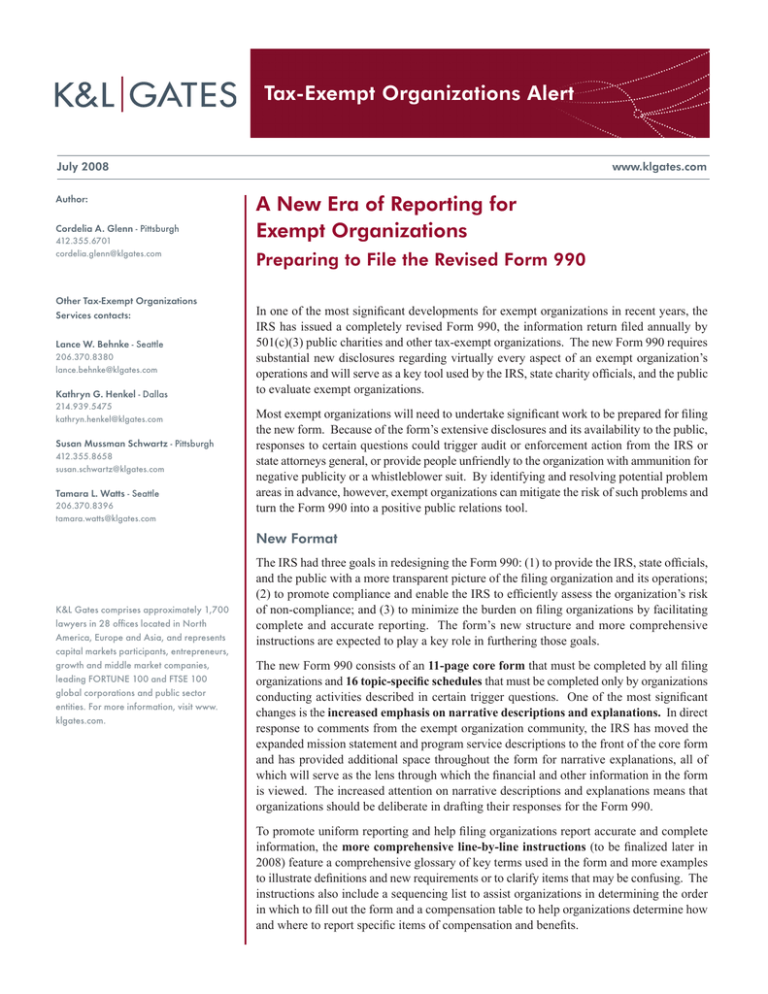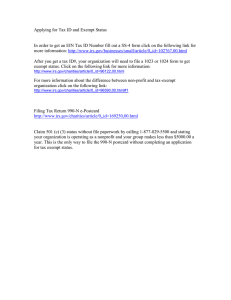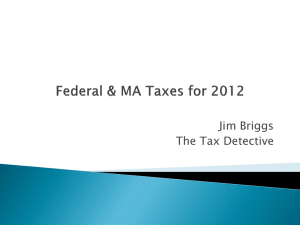
Tax-Exempt Organizations Alert
July 2008
Author:
Cordelia A. Glenn - Pittsburgh
412.355.6701
cordelia.glenn@klgates.com
Other Tax-Exempt Organizations
Services contacts:
Lance W. Behnke - Seattle
206.370.8380
lance.behnke@klgates.com
Kathryn G. Henkel - Dallas
214.939.5475
kathryn.henkel@klgates.com
Susan Mussman Schwartz - Pittsburgh
412.355.8658
susan.schwartz@klgates.com
Tamara L. Watts - Seattle
206.370.8396
tamara.watts@klgates.com
www.klgates.com
A New Era of Reporting for
Exempt Organizations
Preparing to File the Revised Form 990
In one of the most significant developments for exempt organizations in recent years, the
IRS has issued a completely revised Form 990, the information return filed annually by
501(c)(3) public charities and other tax-exempt organizations. The new Form 990 requires
substantial new disclosures regarding virtually every aspect of an exempt organization’s
operations and will serve as a key tool used by the IRS, state charity officials, and the public
to evaluate exempt organizations.
Most exempt organizations will need to undertake significant work to be prepared for filing
the new form. Because of the form’s extensive disclosures and its availability to the public,
responses to certain questions could trigger audit or enforcement action from the IRS or
state attorneys general, or provide people unfriendly to the organization with ammunition for
negative publicity or a whistleblower suit. By identifying and resolving potential problem
areas in advance, however, exempt organizations can mitigate the risk of such problems and
turn the Form 990 into a positive public relations tool.
New Format
K&L Gates comprises approximately 1,700
lawyers in 28 offices located in North
America, Europe and Asia, and represents
capital markets participants, entrepreneurs,
growth and middle market companies,
leading FORTUNE 100 and FTSE 100
global corporations and public sector
entities. For more information, visit www.
klgates.com.
The IRS had three goals in redesigning the Form 990: (1) to provide the IRS, state officials,
and the public with a more transparent picture of the filing organization and its operations;
(2) to promote compliance and enable the IRS to efficiently assess the organization’s risk
of non-compliance; and (3) to minimize the burden on filing organizations by facilitating
complete and accurate reporting. The form’s new structure and more comprehensive
instructions are expected to play a key role in furthering those goals.
The new Form 990 consists of an 11-page core form that must be completed by all filing
organizations and 16 topic-specific schedules that must be completed only by organizations
conducting activities described in certain trigger questions. One of the most significant
changes is the increased emphasis on narrative descriptions and explanations. In direct
response to comments from the exempt organization community, the IRS has moved the
expanded mission statement and program service descriptions to the front of the core form
and has provided additional space throughout the form for narrative explanations, all of
which will serve as the lens through which the financial and other information in the form
is viewed. The increased attention on narrative descriptions and explanations means that
organizations should be deliberate in drafting their responses for the Form 990.
To promote uniform reporting and help filing organizations report accurate and complete
information, the more comprehensive line-by-line instructions (to be finalized later in
2008) feature a comprehensive glossary of key terms used in the form and more examples
to illustrate definitions and new requirements or to clarify items that may be confusing. The
instructions also include a sequencing list to assist organizations in determining the order
in which to fill out the form and a compensation table to help organizations determine how
and where to report specific items of compensation and benefits.
Tax-Exempt Organizations Alert
Areas of Interest
The information required in the new Form 990 falls
within several different areas of interest, many of
which are summarized below.
Governance, Management, and Public Disclosures.
The IRS believes that the existence of an independent
governing body and well-defined governance and
management policies and practices increase the
likelihood that an organization is operating in
compliance with federal law. Accordingly, the new
Form 990 places significant emphasis on corporate
governance matters and will require each filing
organization, among other things, to:
• Disclose the number of voting governing
body members that are “independent” (i.e.,
do not receive material financial benefits from
the organization).
• Disclose whether the Form 990 was provided to
the governing body prior to filing and describe
the process, if any, by which the directors,
officers, trustees, committee members or
management reviewed the Form 990.
•D isclose whether the filing organization’s
conflict of interest policy requires directors,
officers, trustees, and key employees to make
an annual disclosure of interests that could
give rise to a conflict and describe how the
organization regularly and consistently monitors
and enforces compliance with the policy.
•D isclose whether the organization has a
whistleblower policy and document retention
and destruction policy.
• Describe the processes used to determine
compensation of its top management official,
officers, and key employees and, specifically,
whether such processes include review and
approval by independent persons, use of
comparability data, and contemporaneous
substantiation of the deliberation and decision.
•If an organization invested or participated in one
or more joint ventures with a taxable entity or
individual, disclose whether the organization has
adopted a written policy or procedure requiring
negotiation of terms designed to protect the
organization’s exempt status and has actually
taken steps to safeguard such exempt status.
•Provide information on its disclosure practices
with respect to its Form 990, Form 990-T, and
Form 1023 or 1024 and disclose how (if at
all) it makes its governing documents, conflict
of interest policy, and financial statements
available to the public.
Compensation. Consolidated and expanded
compensation disclosures will increase the
transparency of compensation information for all
exempt organizations and provide the IRS with
more information to assess the reasonableness of
compensation. All filers (including non-charitable
exempt organizations) now must report in the core
form compensation for all current and certain former
directors, officers, trustees, key employees, the five
highest compensated employees, and the five highest
compensated independent contractors. To reduce
subjectivity, compensation is now reported for the
calendar year ending with or within the organization’s
tax year based on Forms W-2 and 1099, although
fiscal year institutions will still use the fiscal year
methodology to report aggregate compensation on the
statement of expenses.
In addition, if certain triggers are met, the filing
organization must complete Schedule J, which requires
significant new disclosures regarding the organization’s
compensation and expense reimbursement practices, as
well as a more detailed breakdown of compensation
and benefits received by certain individuals.
Organizations required to complete Schedule J are
likely to experience additional burdens in reporting the
required information.
Fundraising. In response to concerns regarding
misreporting of fundraising activities, the IRS has
introduced Schedule G, which requires expanded
disclosures regarding relationships with outside
fundraising counsel and professional solicitors and
compliance with state charitable solicitation laws.
Organizations that receive more than $15,000 from
gaming activities (e.g., bingo, Texas hold’em and other
card games, raffles, and casino nights) also will be
subject to disclosures regarding their compliance with
state gaming laws. The disclosures on Schedule G are
July 2008 | 2
Tax-Exempt Organizations Alert
likely to be of interest to state officials responsible for
enforcing charitable solicitation and gaming laws.
Organizations that receive more than $25,000 in noncash contributions or contributions of specified types of
property (including items donated for auction) should
take note of new reporting requirements in Schedule
M, which are likely to result in more burdensome
recordkeeping practices for such organizations.
U.S. Grantmaking. Reporting of U.S. grantmaking
activities remains largely unchanged, although
organizations that make more than $5,000 in grants
to organizations or individuals in the U.S. must
describe their procedures for monitoring the use of
grant funds.
Foreign Activities. The new Schedule F requires
significant new disclosures regarding the activities of
organizations with more than $10,000 in aggregate
revenues or expenses from grantmaking, fundraising,
and/or programs in foreign countries. Large
organizations with operations in multiple areas of
the world likely will be required to implement more
extensive recordkeeping practices regarding their
foreign activities (including tracking of expenditures by
region) in order to comply with the new requirements,
although the reporting thresholds will minimize the
impact on smaller organizations that simply make
limited grants outside the U.S.
Interested Persons and Related Organizations. The
IRS shows continued interest in transactions involving
insiders and related organizations. The new form
consolidates in Schedule L the reporting of most
relationships and transactions involving insiders (i.e.,
current and former directors, officers, trustees, key
employees, and other disqualified persons). The new
Schedule R requires more extensive reporting with
respect to (1) related organizations, their activities,
ownership/control, and the filing organization’s share
in the income and assets of such related organizations
and (2) certain unrelated partnerships through which
the organization conducted significant activities. These
new disclosures are likely to require organizations filing
Schedule R to institute new recordkeeping practices.
Tax-Exempt Bonds.
To address perceived
noncompliance with respect to tax-exempt bonds,
the IRS has introduced Schedule K, which requires
substantial new disclosures regarding the investment of
and expenditures from bond proceeds, as well as private
use of bond-financed facilities. The new reporting
requirements are expected to impose significant
additional reporting burdens on organizations that
have borrowed through the use of tax-exempt bonds
and other forms of tax-exempt debt.
Hospitals. Organizations operating hospitals must
complete the new Schedule H, which requires
significant data regarding charity care, community
benefits, and community building activities, as well as
narrative descriptions of how they assesses the health
care needs of the communities that they serve, how
they inform patients regarding their charity care policy
and eligibility for government assistance, and how they
promote the health of the communities they serve.
Disclosures regarding bad debt, Medicare payments,
collection practices, management companies, and joint
ventures are also required. It is likely that Congress
and/or the IRS will use the data compiled in Schedule
H to assess the need for legislative or regulatory
changes regarding the manner in which hospitals may
qualify for and maintain exemption, an issue which has
garnered significant attention in recent years.
Transition Relief
In recognition of the significant changes brought by the
new Form 990 and the modifications to recordkeeping
practices that may be necessary, the IRS has provided
for the following phase-in periods that will permit
certain small organizations to file the simpler Form
990-EZ for tax years beginning in 2008 and 2009.
May file Form 990-EZ for:
If gross receipts are:
And if assets are:
2008 tax year (filed in 2009)
> $25,000 and <$ 1 million
< $2.5 million
2009 tax year (filed in 2010)
> $25,000 and <$500,000
< $1.25 million
2010 and later tax years
> $50,000 and <$200,000
< $500,000
July 2008 | 3
Tax-Exempt Organizations Alert
Transition relief also exists for organizations required
to complete the new schedules for hospitals (Schedule
H) and tax-exempt bonds (Schedule K). For tax years
beginning in 2008, filing organizations are required
to provide only certain identifying information, with
completion of the entire schedules required for tax
years beginning in 2009.
Recommendations
To properly position themselves for the first filing of
the revised Form 990, exempt organizations should
start preparing now by taking the following steps:
1. E ducate the governing board and management
regarding the new requirements imposed by the
Form 990. Develop and formalize a process for the
preparation and review of the Form 990.
2. Consider a trial run using 2007 data to expose
areas requiring additional recordkeeping, identify
potential problem areas, and determine where new
or revised narrative descriptions are needed. This
is particularly important for hospitals and other
complex organizations that are likely to experience
a substantial additional burden in preparing the
new form.
3. Identify related organizations and joint ventures for
which reporting will be required. Work with legal
counsel to develop a written policy regarding the
organization’s involvement in joint ventures.
4. Identify and review financial arrangements with
disqualified and other interested persons and
restructure problematic arrangements, if possible.
Work with legal counsel to develop a process
for evaluating such arrangements to ensure
that appropriate safeguards and best practices
are implemented.
5. Prepare and ask your governing body to approve
a conflict of interest policy, whistleblower policy,
and document retention and destruction policy. If
such policies are already in place, review and update
them as necessary to ensure that they reflect current
best practices. Also ask the board to determine
the organization’s position with respect to public
disclosure of the organization’s application for
exemption, Form 990, governing documents, conflict
of interest policy, and financial statements.
6. For organizations engaged in fundraising, work
with legal counsel to assess compliance with state
charitable solicitation and gaming laws.
7. For grantmaking organizations, ensure that adequate
procedures are in place to monitor the use of
grant funds.
The goal of each filing organization should be to use
the new Form 990 to present as good a public profile
as possible. Taking the foregoing steps will go a long
way toward turning the Form 990 from a document
that invites unwanted attention to one that serves as a
positive public relations tool for your organization.
If you have questions about the new Form 990 and
what your organization should do to prepare for the
first filing, please contact your K&L Gates lawyer for
more information and guidance.
K&L Gates comprises multiple affiliated partnerships: a limited liability partnership with the full name K&L Gates LLP qualified in Delaware and
maintaining offices throughout the U.S., in Berlin, in Beijing (K&L Gates LLP Beijing Representative Office), and in Shanghai (K&L Gates LLP Shanghai
Representative Office); a limited liability partnership (also named K&L Gates LLP) incorporated in England and maintaining our London and Paris
offices; a Taiwan general partnership (K&L Gates) which practices from our Taipei office; and a Hong Kong general partnership (K&L Gates,
Solicitors) which practices from our Hong Kong office. K&L Gates maintains appropriate registrations in the jurisdictions in which its offices are
located. A list of the partners in each entity is available for inspection at any K&L Gates office.
This publication/newsletter is for informational purposes and does not contain or convey legal advice. The information herein should not be used or
relied upon in regard to any particular facts or circumstances without first consulting a lawyer.
Data Protection Act 1998—We may contact you from time to time with information on K&L Gates LLP seminars and with our regular newsletters,
which may be of interest to you. We will not provide your details to any third parties. Please e-mail london@klgates.com if you would prefer not to
receive this information.
©1996-2008 K&L Gates LLP. All Rights Reserved.
July 2008 | 4



